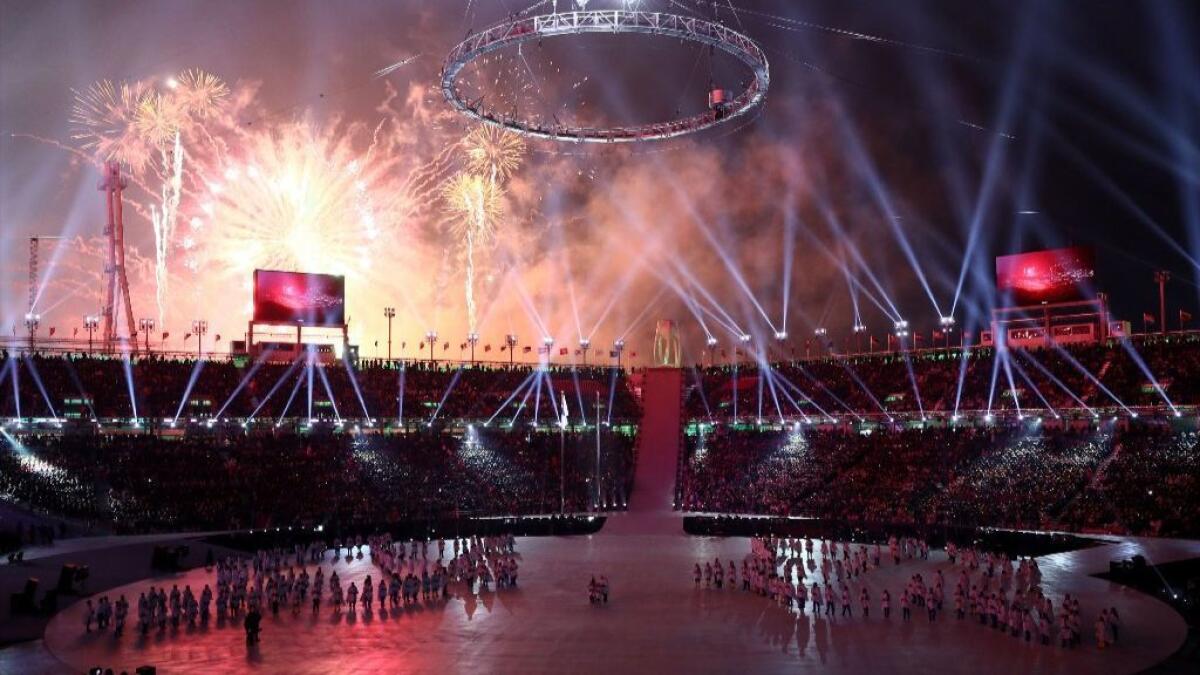Column: Opening ceremony tried but it’s the Winter Games athletes who are needed to unite us

Reporting from PYEONGCHANG, South Korea — The day started on a bus, and with a view that is common around here. South Korean soldiers were at the base of a resort mountain, metal detectors in hand, inspecting the grounds outside of a house serving as a designated meeting place for Slovenian athletes and officials.
The routine nature of these safety patrols underscores a disheartening reality: The Olympics don’t take place in a bubble. They are very much a part of the real world.
The opening ceremony of the Pyeongchang Games on Friday night was designed to convince its audience otherwise. Peace and harmony were the primary themes of the program, which depicted the mystical journey of five children to a utopian future. The motif was reinforced by the North and South Korean athletes, who marched together under the Korean Unification Flag.
The ceremony was well-intended, and visually stunning at times, but it failed to conjure any significant hope. Buying into the fairy tale was almost impossible. There were too many reminders of the real world nearby.
What gradually became evident over the two-hour ceremony was that if these Olympics are to unify people through sport, if they are to live up to their ideals, the onus is on the athletes.
Exceptional athletic performances can inspire optimism in human potential and fortitude. They can illuminate the dreams and values shared throughout an increasingly divided world, reminding people of their common humanity.
Gold medals don’t require translations.
Perhaps the inspirational figure of these Games will be a veteran such as Shaun White or Lindsey Vonn. Or a newcomer such as figure skater Nathan Chen, short track speedskater Maame Biney or snowboarder Chloe Kim. Or a lesser-known athlete who made unfathomable sacrifices to reach this stage.
“Dear athletes,” International Olympic Committee President Thomas Bach said, “now it’s your turn.”
Making a global impact will be particularly difficult for an athlete in these times, in large part because of how cynically the Olympics are perceived.
As much as athletes and organizers claim sports and politics are separate, that’s clearly not the case. U.S. Vice President Mike Pence was seated near Kim Yo Jong, the sister of North Korean leader Kim Jong Un, but the two didn’t interact, according to the vice president’s office. Pence said only two days earlier that the United States was close to unveiling its toughest sanctions to date on North Korea, which has tested long-range missiles and nuclear weapons.
What looks like goodwill on the surface is often nothing more than grandstanding. Bach pointed to the combined North and South Korean team as a symbol of unity, saying he hoped it would make as strong a statement as when the IOC fielded a refugee team two years ago at the Summer Olympics in Rio de Janeiro. Considering how unwelcoming the U.S. has become to refugees, this country must have missed what Bach described as “a powerful message of hope.”
The integrity of the Games has been compromised by performance-enhancing drugs, highlighted this time around by Russia’s banishment over a state-sanctioned doping program. Eligible Russian athletes marched Friday night under the flag of the IOC instead of their country. The drug issue has become pronounced enough that Bach was compelled to warn the athletes to not cheat.
“You can only really enjoy your Olympic performance if you respect the rules and stay clean,” Bach said.
There is also a growing perception the Olympics are economically harmful to their host cities in the long run. Whatever the reality, the common view is that places such as Pyeongchang are smash-and-grab victims of the IOC.
It’s harder than ever to believe in what the Olympics stand for, but never underestimate the influence of exceptional performers, athletic or otherwise.
What was a relatively low-energy crowd at Pyeongchang Olympic Stadium for most of Friday night suddenly awakened from its slumber when a familiar song was played over the sound system: Psy’s “Gangnam Style.” The Korean-language song was once a worldwide sensation, courtesy of a hilarious music video. Most listeners had no idea what the song was about, but it didn’t matter. Psy’s physical comedy resonated with a wide range of audiences. Almost six years later, the song proved capable of bringing people together.
Over the next 16 days, something similar will happen, only this time it will take place in ice rinks and on mountain slopes. A new generation of cross-cultural heroes will emerge, the languages they speak secondary to how far they can push their bodies.
The world won’t change, but how people feel about it will. There’s value in that.
Follow Dylan Hernandez on Twitter @dylanohernandez
More to Read
Go beyond the scoreboard
Get the latest on L.A.'s teams in the daily Sports Report newsletter.
You may occasionally receive promotional content from the Los Angeles Times.










